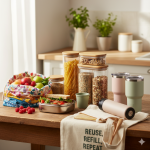The global push for sustainability has sparked a surge in innovation across industries, and one area that’s gaining significant traction is plant-based packaging. As the detrimental impacts of plastic waste become more apparent, companies are seeking eco-friendly alternatives to traditional packaging materials. Plant-based packaging presents a promising solution, offering biodegradability, renewability, and a reduced carbon footprint.
Several companies are at the forefront of this movement, pioneering the development of plant-based packaging solutions that are both practical and environmentally responsible. Let’s take a closer look at some of these innovative companies and the strides they’re making towards a more sustainable future.
For an engaging revelation of this report – https://www.towardspackaging.com/personalized-scope/5122
- EcoEnclose: Specializing in shipping and packaging materials, EcoEnclose offers a range of plant-based packaging options, including biodegradable mailers, compostable bags, and recyclable boxes. Their products are made from materials such as recycled paper, corn-based bioplastics, and plant-derived cellulose, providing eco-conscious businesses with viable alternatives to conventional packaging.
- Tipa: Tipa is revolutionizing the food packaging industry with its fully compostable and flexible packaging solutions. Using bio-based polymers derived from plants, their packaging mimics the properties of traditional plastic while being compostable in industrial facilities. This innovation allows brands to maintain product freshness and shelf life without compromising on sustainability.
- Eco-friendly Packaging: This company offers a wide range of sustainable packaging solutions made from materials such as bamboo, sugarcane, and cornstarch. Their products span various industries, including food and beverage, cosmetics, and e-commerce. From compostable food containers to biodegradable packing peanuts, Eco-friendly Packaging is committed to reducing environmental impact without sacrificing functionality.
- Loop Industries: Loop Industries focuses on transforming plastic waste into high-quality, food-grade packaging through their innovative depolymerization process. By breaking down PET plastic into its basic building blocks, Loop creates virgin-quality PET resin without the need for fossil fuels. This closed-loop approach not only reduces plastic pollution but also helps conserve resources and lower greenhouse gas emissions.
- Biomass Packaging: Biomass Packaging specializes in creating sustainable packaging solutions using agricultural residues and natural fibers. By utilizing materials like wheat straw, bagasse, and hemp, they offer a range of compostable and biodegradable products, including trays, containers, and cutlery. Biomass Packaging’s commitment to renewable resources and circular design principles sets a precedent for a more regenerative approach to packaging.
These companies represent just a handful of the many innovators driving the transition towards plant-based packaging. As consumer awareness and demand for sustainable products continue to grow, we can expect further advancements and collaborations within the industry. By embracing plant-based materials and innovative technologies, these companies are not only reducing environmental harm but also paving the way for a more circular and sustainable economy.
Make a smart decision – acquire our study for valuable information: https://www.towardspackaging.com/price/5122
To Access our Premium Real-Time Data Intelligence Tool, Visit: https://www.precedencestatistics.com/request-for-demo
Scrutinize More:





Leave a Reply